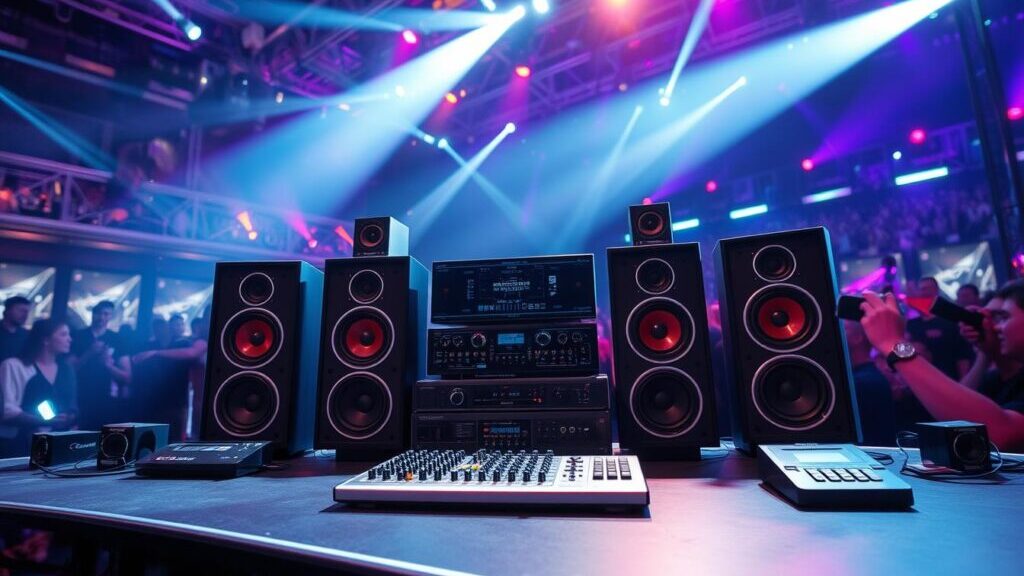
The Cost-Effective Advantage of Rental of Audio Sound Systems vs Buying
When planning an event—whether it’s a wedding, concert, corporate seminar, or community festival—quality sound is essential. Clear, powerful audio ensures that your message or music is heard by everyone in attendance. However, one of the most important decisions event organisers face is whether to buy or rent an audio sound system. While owning may seem appealing at first glance, the rental of audio sound systems often proves to be a far more cost-effective and practical solution.
1. Lower Upfront Costs and Financial Flexibility
Purchasing a professional audio sound system involves a significant investment. A high-quality setup, including speakers, mixers, microphones, and amplifiers, can cost thousands of pounds or more. This is often impractical, especially for small businesses, event organisers, or individuals who only host events occasionally.
By choosing audio sound system rental, you can access premium-grade equipment for a fraction of the purchase price. This frees up your budget for other crucial event elements such as venue hire, lighting, or catering. You pay only for what you need, when you need it, which makes rentals a far more flexible and financially sensible option.
2. Access to Professional-Grade Equipment
Audio technology evolves rapidly. The equipment that is top-of-the-line today can become outdated in just a few years. When you buy your own sound system, you face the challenge of keeping up with constant upgrades and maintenance costs.
In contrast, rental providers regularly update their inventory, ensuring clients always have access to the latest and most reliable equipment. This means you can enjoy professional-quality sound without worrying about depreciation, storage, or obsolescence. Whether your event requires a small PA system for a private gathering or a full concert setup, you can always choose the latest technology suited to your needs.
3. Maintenance and Technical Support Included
Owning an audio system means taking on full responsibility for its upkeep. Repairs, replacements, and regular servicing can quickly add up, turning ownership into an ongoing expense. Moreover, handling technical issues on the day of an event can be stressful and time-consuming.
With rental of audio sound systems, these worries are eliminated. Most rental companies include maintenance and technical support as part of the package. Their experienced technicians ensure the equipment is properly set up, tested, and ready to deliver top-quality sound. If any issue arises, they are on standby to troubleshoot and resolve it immediately—saving you both time and stress.
4. No Storage or Transportation Hassles
Audio equipment is bulky and requires proper storage conditions to prevent damage. Storing large speakers, amplifiers, and cables can be impractical for those who do not frequently use them. Transporting the system to and from venues also requires suitable vehicles and manpower.
When you rent an audio sound system, logistics are usually handled by the rental provider. They deliver, install, and dismantle the equipment for you. This convenience not only saves money on transportation and storage but also ensures that all components are professionally handled and optimised for the venue’s acoustics.
5. Customised Solutions for Every Event
Every event has unique audio needs. A corporate presentation requires crisp voice clarity, while a concert demands rich, immersive sound. When you own equipment, you’re limited to the capabilities of your system, which may not suit all situations.
However, rental companies offer tailored packages based on your event type, size, and location. You can rent additional microphones, subwoofers, or mixing consoles as required—without investing in unnecessary gear you might not use again. This flexibility ensures you always get the right setup for the occasion, optimising both sound quality and cost-efficiency.
6. Ideal for Occasional Use
If you host only a few events a year, purchasing an audio system is unlikely to be cost-effective. Equipment sitting unused for long periods still requires storage and maintenance, not to mention the risk of it becoming outdated.
Renting makes far more sense in such cases. You pay only for the days you need the system, making it the ideal choice for occasional events, seasonal promotions, or one-time celebrations. It’s a practical, pay-as-you-go model that ensures top-quality sound without unnecessary long-term expenses.
7. Professional Setup for Peace of Mind
Setting up a sound system requires technical expertise. Improper wiring or speaker placement can result in poor sound quality, feedback, or equipment damage. When you rent, professional technicians handle setup and calibration, ensuring that the sound is balanced and tailored to your venue’s acoustics. This professional touch not only enhances the listening experience but also minimises the risk of costly mistakes.
8. Environmentally and Economically Sustainable
Renting equipment also supports sustainability. Sharing and reusing sound systems reduces electronic waste and resource consumption. From an economic standpoint, it contributes to a more circular economy where equipment is used efficiently and maintained for longer lifespans—benefiting both businesses and the environment.
Conclusion: Smart Savings and Superior Sound
In today’s fast-paced event industry, flexibility and cost-efficiency are key. The rental of audio sound systems offers a smart, budget-friendly alternative to ownership, providing access to high-quality equipment without the burden of maintenance, storage, or upgrades.
Whether you’re organising a wedding, corporate function, or live concert, renting ensures that you get professional-grade sound performance at a fraction of the cost. It’s the perfect combination of affordability, convenience, and quality—proving that sometimes, renting truly is the smarter investment.